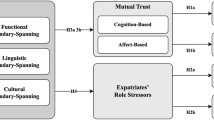Abstract
This paper reports an empirical investigation of individual preferences in the use of managerial influence tactics by Hong Kong Chinese and Americans. Subjects in a cross-cultural scenario study were asked to evaluate alternative upward and downward influence tactics in terms of their preferred usage. The findings indicate a main effect for culture and for direction of influence attempt. In addition, direction of influence attempt interacts with subject gender and culture on a tactic-by-tactic basis to reveal differences in influence preferences. Implications of the findings and directions for future studies are discussed.
Similar content being viewed by others
References
Adler, N J, Docktor, R and Redding, S G, (1986), From the Atlantic to the Pacific century: cross-cultural management revisited,Journal of Management 12, No 2, 295–318.
Bond, M H and Hwang, K K, (1986), The social psychology of the Chinese people, in M H Bond, ed:The Psychology of the Chinese People, Oxford University Press, Hong Kong.
Brislin, R W, (1970), Back-translation for cross-cultural research,Journal of Cross-Cultural Psychology 1, No 3, 185–216.
Child, J, (1981), Culture, contingency and capitalism in the cross-national study of organisations, in L L Cummings and B M Staw, eds:Research in Organizational Behavior, Vol 3, Greenwich, CT: JAI Press.
Chow, I H, (1989), Power tactics and influence strategies used by managers in the People's Republic of China,Proceedings of the Third International Conference on Managing in a Global Economy, Eastern Academy of Management and The Chinese University of Hong Kong, Hong Kong.
Feather, N T, (1979), Values, expectancy, and action,American Psychologist 14, No 2, 243–260.
Hofstede, G, (1980),Culture's Consequences, Sage, Beverly Hills, California.
Hofstede, G and Bond, M H, (1988), The Confucius connection: from culture roots to economic growth,Organizational Dynamics 16, No 1, 4–21.
Kaplan, R E, (1984), Trade routes: the manager's network of relationships,Organizational Dynamics 12, No 4, 37–52.
Kipnis, D and Schmidt, S M, (1986), Upward-influence styles: relationship with performance evaluations, salary, and stress,Administrative Science Quarterly 33, No 4, 528–542.
Kipnis, D, Schmidt, S M, and Wilkinson, I, (1980), Intraorganizational influence tactics: explorations in getting one's way,Journal of Applied Psychology 65, No 4, 440–452.
Kipnis, D, Schmidt, S M, Swaffin-Smith, C, and Wilkinson, I, (1984), Patterns of managerial influence: shotgun managers, tacticians, and bystanders,Organizational Dynamics 12, No 3, 58–67.
Kotter, J P, (1978), Power, success, and organizational effectiveness,Organizational Dynamics 6, No 3, 27–40.
Kotter, J P, (1982),The General Managers, Free Press, New York.
Lonner, W J, (1980), The search for psychological universals, in H C Triandis and W W Lambent, eds:Handbook of Cross-Cultural Psychology, Vol 1, Alleps and Bacon, Boston.
Luthans, F, Hodgetts, R and Rosenkrantz, S, (1987),Real Managers, Ballinger, New York.
Mintzberg, H, (1973),The Nature of Managerial Work, Harper and Row, New York.
Mowday, R T, (1978), The exercise of upward influence in organizations,Administrative Science Quarterly 23, No 1, 137–156.
Porter, L, Allen, R and Angle, H, (1981), The politics of upward influence in organizations, in L L Cummings and B M Staw, eds:Research in Organizational Behavior, Vol 3, Greenwich, CT: JAI Press.
Redding, S G, (1988), Research on Asian cultures and management: some epistemological issues,Asia Pacific Journal of Management 1, No 5, 89–96.
Redding, S G and Wong, G Y Y, (1986), The psychology of Chinese organizational behavior, in M H Bond, ed:The Psychology of the Chinese People, Oxford University Press, Hong Kong.
Schilit, W K, (1986), An examination of individual differences as a moderator of upward influence activities in strategic decisions,Human Relations 39, No 3, 781–794.
Schilit, W K and Locke, E A, (1982), A study of upward influence in organizations,Administrative Science Quarterly 27, No 2, 304–316.
Smith, P B and Peterson, M, (1988),Leadership in Context: A Cultural Analysis of Organizational Behavior, Sage, London.
Smith, P B and Tayeb, M, (1988), Organization structure and processes, in M H Bond, ed:The Cross-Cultural Challenge to Social Psychology, Sage, Beverly Hills, California.
Smith, P B, Misumi, J, Tayeb, M, Peterson, M and Bond, M H, (1989), On the generality of leadership style measures across cultures,Journal of Occupational Psychology 62, No 2, 97–109.
Author information
Authors and Affiliations
Additional information
This research was supported by The Chinese University of Hong Kong. The special assistance of Mimi Kam and Ricky Lam in back-translation of the research instruments is appreciated, as are the contributions of Joseph Raelin of Boston College and Harold Welsch of Depaul University in data collection.
Rights and permissions
About this article
Cite this article
Schermerhorn, J.R., Bond, M.H. Upward and downward influence tactics in managerial networks: A comparative study of Hong Kong Chinese and Americans. Asia Pacific J Manage 8, 147–158 (1991). https://doi.org/10.1007/BF01731937
Issue Date:
DOI: https://doi.org/10.1007/BF01731937




